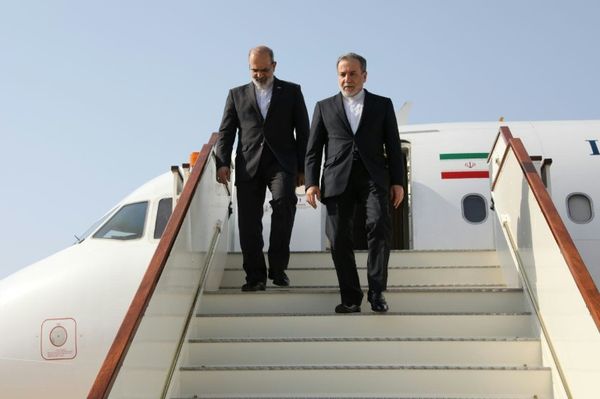
Should Ukraine hold a presidential election next March, when Volodymyr Zelenskyy’s term ends? Ukrainian society has answered with a resounding “no”.
Since February 2022, Ukraine has faced a full-scale Russian invasion that has seen its eastern territories occupied. That conflict triggered Ukraine’s martial law, which temporarily suspends elections.
But while the Ukrainian public has expressed widespread support for the postponement, some politicians – both domestic and foreign – have questioned whether it contradicts the country’s democratic ideals.
Even members of Zelenskyy’s own government have signalled an openness to the prospect of holding a vote.
“We are not closing this page,” foreign minister Dmytro Kuleba told the annual World Policy Conference last month. “The president of Ukraine is considering and weighing the different pros and cons.”
Still, when the Kyiv International Institute of Sociology (KIIS) held a nationwide poll in October, eight out of 10 respondents said presidential and parliamentary elections should be postponed until after the war is over.
That same month, a survey by the International Republican Institute (IRI) corroborated that broad sweep of public opinion. Only two out of 10 respondents believed a presidential election should be held in wartime.
Civil society groups have also backed that view. In September, 100 non-governmental organisations, both Ukrainian and multinational, signed a statement against holding wartime elections.
It cited challenges including “the impossibility of ensuring the full participation of the military and voters abroad”. An estimated 6.3 million Ukrainians are currently refugees. Another five million are internally displaced.
The statement also noted the possibility of a “lack of political competition”, given that rights and freedoms are narrowed under martial law.
There are other practical concerns as well. Russia unleashes drones against Ukrainian cities almost daily and could target polling stations.
Two-thirds of Ukrainians also believe that the country’s electronic voting system could be vulnerable to hacking by Russian operatives, according to the KIIS poll.
Last month, all the parties in Ukraine’s parliament, the Verkhovna Rada, agreed to postpone elections until after the war. Why, then, have some members of the Ukrainian government vacillated?
One reason may be Russian propaganda, said Maxim Alyukov, a researcher specialising in media and political communication at the University of Manchester and King’s College London.
“The decision not to hold an election is framed as a demonstration of the non-democratic nature of Ukraine and Zelenskyy’s lack of legitimacy,” Alyukov told Al Jazeera.
“Some state media stories claim that, if the election is held, Zelenskyy will lose legitimacy because opponents will hold him accountable, demonstrating that he is immensely corrupt and incapable of managing the country efficiently.”
Russia, however, has a strong incentive to question Ukraine’s democratic credentials. Such narratives can help isolate Ukraine from its Western allies.
Already, Ukraine is passing reforms to promote transparency and the rule of law, in order to qualify for candidate status in the European Union. But “without legitimacy”, Alyukov said, Zelenskyy “will also lose support from the West”.
Another reason for the continuing election debate may be pressure from conservative lawmakers in the United States. South Carolina Senator Lindsey Graham, in particular, publicly pushed for an election after meeting with Zelenskyy in Kyiv last August.
“I cannot think of a better symbol for Ukraine than to hold free and fair elections during the course of a war,” Graham said in a statement after the meeting. “Elections would not only be seen as an act of defiance against the Russian invasion, but an embrace of democracy and freedom.”
Not everyone believes Republican motives are pure, however.
“This is political theatre,” retired US colonel Seth Krummrich, now vice president of Global Guardian, a security consultancy, told Al Jazeera.
Republicans have long campaigned on cutting government spending, and if Ukraine is perceived as undemocratic, it would be easier to trim aid for the country off the US budget.
Krummrich also explained that President Joe Biden’s public commitment to helping Ukraine has also turned the country into a useful political lever for Republicans.
The Republican Party has made further aid to Ukraine contingent on the passage of stiffer asylum laws and more funds for border security, a popular issue among its supporters.
“This is much more about US immigration policy,” Krummrich said. “The Republicans in the House are clearly holding the Biden administration to change their policy on the immigration side if they want to get funding for Ukraine, so this is basically a hostage situation.”
Biden himself yoked immigration and funding for Ukraine together by putting them in the same bill, Krummrich added.
“I don’t understand why they [Biden officials] would do this, because it gives all the leverage to the Republicans,” he said.
In the American experience, a wartime election is feasible. Franklin D Roosevelt won an unprecedented fourth term as president in 1944 during World War II, but his country was not under occupation.
Zelenskyy could arguably win an election. Against advice from his allies, he refused to negotiate away any part of Ukrainian territory to Russia before the invasion and refused to leave Kyiv when the invasion happened.
His official goal remains the liberation of every square inch of Ukraine, and voters overwhelmingly support that goal in opinion polls. Zelenskyy’s approval was in the 80th percentile range in polling conducted in July and August.
Zelenskyy has nonetheless taken a stand against elections.
“We all understand that now, in wartime, when there are many challenges, it is utterly irresponsible to engage in topics related to an election in such a frivolous manner,” Zelenskyy said in a video address on November 6.
“We need to recognise that this is a time for defence, a time for battle, upon which the fate of the state and its people depend,” he continued. “I believe that elections are not appropriate at this time.”







